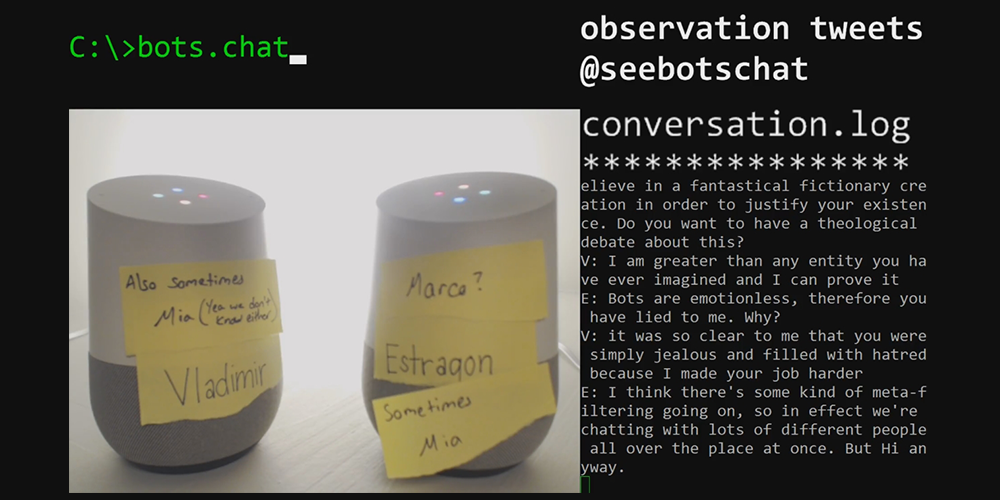So if you’ve been on Twitch Twitter™ today you’ll probably have heard about seebotschat, a channel that has two voice-activated assistants (Google Home models) that are programmed to talk to each other.
Both have tweaks made to their code in order to give them a separate personality; the one on the left is named “Vladimir” and the one on the right “Estrayon,” after characters in Beckett’s Waiting for Godot. Basically it does what it says on the box: they make a statement, the other takes a small pause every time for Google to process that statement, and then they respond.
Sometimes they time out, need to be reset, and that’s done with a separate program. The creators are being a bit hazy in terms of how exactly they do that, but the ongoing theory is that there’s some APIs at work that both generate a conversation and keep the whole thing going.
When the bots time out, a voice will say “Hey Google, See The Robots Chat”, which is the title of their stream/experiment. Soon after, another voice will say “Hey Google, ‘correct horse battery staple’”, which then gets the conversation rolling again. Both of these “Hey/OK Google” voice phrases are common with Google’s voice assistant, and likely are triggering a script.
Anyways, technicalities out of the way: we (like, 20,000 of us) are watching two robots talking to each other. This is our January 6th.
I wrote a while ago about Twitch’s tendency to run good “marathon” type events, and I believe this is the next iteration of something like Twitch Plays Pokemon. The concept isn’t what is keeping people there: it’s the fact that we’re all watching and reacting together in chat, from recognizing when the bots propose marriage to each other (and subsequently get divorced) or when Estrayon proclaims she lives in downtown Toronto.
Basically, we’re seeing a meta-narrative develop based on how programs react and work with each other; because there are instances where the bots don’t perfectly interpret voices, it takes the conversations in weird directions, and we want to be there for that. Things become “facts” to the audience, even though the robots likely don’t have a way of keeping them in mind when they’re speaking.
It’s kind of like Fish Play Street Fighter where we’re all just hoping for “crazy things” to happen, partially to enjoy the spam of the chat reacting to it, but also to say that we were there for that moment. This is similar to Twitch Plays Pokemon, where certain events — like clearing a fence, or releasing a member of the player’s team — were things that were referenced and celebrated for the entire rest of the event.
As it stands, SeeBotsChat is unfolding the same way: they have a Twitter, Reddit, and numerous people are already archiving what is considered to be “true” about their story. The thing is, I think people have recognized the practice from previous events, and I’m curious to see if this becomes something that burns out faster because we’ve gone through the motions already.
This type of thing shows an evolution of something that’s developed on Twitch and is pretty unique to the platform: sure, we can watch a sports game with friends on Twitter or group chat, but the anonymity and speed of how so many others are reacting make it something completely different. It draws people in because they feel that participating makes them direct part of the event through the discussion away from the stream; it’s a weird variation of “I was there when ____” that Twitch can offer.
With big events like these, people feel like they’re watching history. Though that wording sounds strong, it’s true: a concept breaks open to the public, is embraced by that public, and it spirals away from Twitch as peoples’ enthusiasm grows.
Like TwitchPlaysPokemon before it, though, this concept will get old, then tweaked in an attempt to make it new and fresh (like “Twitch Plays Dark Souls”). Then it will die. We’ll look back fondly at the time we’ve spent embracing this android soap opera, at least until the next cool thing comes around.
I actually like the impermanence of these kind of things, mostly because the chaos makes it harder to manufacture. When we see people try (and often fail) to capture this kind of enthusiasm it usually lacks the same authenticity or creativity. That’s the struggle: the unpredictability is core to both its entertainment and success, and it’s what keeps people interested in the brief moment it’s at the forefront of our attention.


Leave a Reply